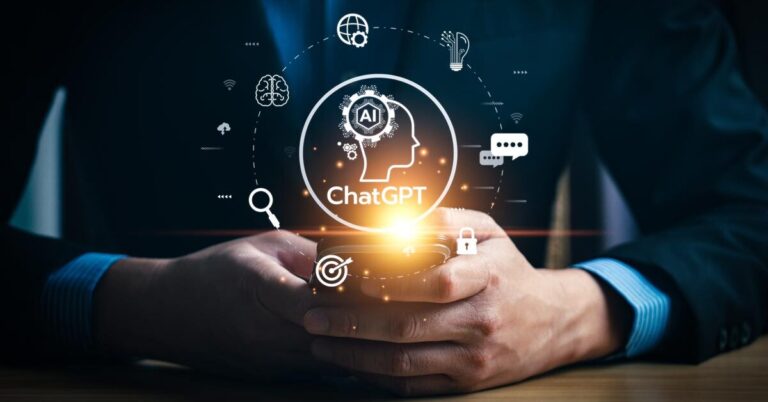
The job market is increasingly competitive, driving job seekers to harness every tool and strategy available to gain a competitive advantage. Generative AI tools like ChatGPT present a valuable opportunity for candidates looking to set themselves apart, but there are also risks that come with using the platform.
Our recruiting experts dove into how ChatGPT is revolutionizing the job application and interview process, as well as benefits and risks for candidates to consider when leveraging this cutting-edge technology.
Things to know about ChatGPT in the Job Application & Interview Process:
- What is ChatGPT?
- Tips for Using ChatGPT
- When should candidates use ChatGPT in the application & interview process?
- When should candidates avoid using ChatGPT in the application & interview process?
What is ChatGPT?
ChatGPT is a powerful language model operated by OpenAI. It has the ability to generate human-like text based on provided prompts. Its applications include content generation, programming help, and creative writing.
Tips for Using ChatGPT
When using ChatGPT or any other generative AI tool, keep the following best practices in mind:
- Be specific and clear in your instructions or prompts
- Start with simple context and gradually add complexity
- Experiment with different phrasing to see how the models respond
- Review and refine generated prompts to check for accuracy. Beware of “hallucinations.”
- Don’t enter personal or private information, such as email, phone number, or other personal identifiers. It will be stored in that database for life.
When should candidates use ChatGPT in the application & interview process?
Individuals who are seeking and applying for jobs in the age of generative AI can benefit most from three applications of the technology:
- Proofreading with ChatGPT
- Extracting skills most relevant to job description
- Interview prep with ChatGPT
Proofreading with ChatGPT
One of the greatest opportunities to leverage generative AI is for proofreading support.
“In my 15+ years of recruiting, I have found there are wonderfully talented individuals with strong skills and deep expertise. But that doesn’t necessarily mean they are great writers.”
Taylor Hadley, Vice President of Recruiting, AIM Consulting
Generative AI tools can help individuals uplevel their existing resume by providing suggestions for stronger wording and improved phrasing. These tools can also generate content for resumes and cover letters based on skills, experiences, and other information provided.
Example prompt: “Proofread this.”
When harnessed correctly, ChatGPT can help technical individuals ensure their application materials are polished, well-written, and impactful.
Extracting most relevant skills
Job applicants – and technical individuals in particular – may not always be adept at highlighting their career skills as they pertain to a specific role. Yet this is a critical element of the job application process – the people who are reviewing resumes aren’t usually technologists and are often looking for buzzwords that match the role they’re trying to fill.
Candidates should begin by creating a foundational resume. When they find a position that piques their interest, they can input bullet points from their resume and must-haves from the job description into ChatGPT. They can then prompt the tool to strategically highlight and position the elements of their resume most relevant to the job.
Example prompts:
- “Extract the details from this resume relevant to this job opportunity.”
- “Based on these skills and this job description, sort these bullet points in order of relevance.”
Leveraging ChatGPT in this way improves applicants’ chances of being noticed by recruiters and considered for the role. In a cooling job market where there is less opportunity for more people, harnessing the engine to highlight relevant skills can make candidates stronger and give them a competitive edge.
Interview prep with ChatGPT
Once candidates make it to the interview stage, proper preparation is key to success. Individuals can use generative AI tools to simulate interviews and practice delivering strong answers.
Example prompts:
- “Given this Product Manager job description, what are questions that a hiring manager may ask when interviewing a candidate for the role?”
- “What are questions a Product Owner might ask a Full Stack .NET Sitecore Developer for a website upgrade/revamp?”
The latter generates specific, relevant questions such as:
- What measures will you take to minimize downtime during the deployment process?
- How do you plan to optimize the performance of the upgraded website?
- What is your strategy for migrating content and data from the current website to the upgraded version?
These prompts evidently generate questions that are highly customized to the position, which gives candidates a significant leg-up when practicing their answers compared to the generic, “Tell me about a time you faced a challenge in the workplace” questions.
A strong interview is critical to landing the job. Using ChatGPT to prepare can help candidates calm their nerves, increase confidence, and effectively speak to their skills and experiences when the actual interview comes around.
When should candidates be cautious using AI in the application & interview process?
Although ChatGPT poses significant benefits, candidates should also be wary of the following situations:
Embellishment on resumes & application materials
ChatGPT can improve and strengthen the language in your application materials; however, it can also overstep into over-architected language and embellishment. This often results in content that is far lengthier than it needs to be and is overcoated.
In a perfect example of the outlandish language that generative AI can spit out, a newspaper went viral after they ran an AI-generated article about a local high school football game. It described the event as “a close encounter of the athletic kind” and included nonsensical sentences like, “The warriors chalked up this decision in spite of the Warhawks’ spirited fourth-quarter performance.”
Applicants should be wary of ChatGPT positioning their skill set in unnatural ways, such as describing day-to-day tasks in their previous role as “remarkable.”
Candidates should also remain cautious about embellishing their application materials or interview answers with skills they don’t have. If you are falsifying information or overstating skills and experience to get the job, you are not going to keep the job – landing the role does not secure your next three, six, or twelve months.
Organizations have a business need, and a specific set of skills is required to fill that business need. If you need ChatGPT to overstate or embellish your skills or competence, the role is likely not the right fit for you.
Using generative AI in interviews
Although ChatGPT is an excellent tool for preparing for potential interview questions, candidates should avoid using it to actually craft their answers for them. Interviewers will notice when your answer is too textbook or sounds unnatural or rehearsed.
Applicants can freely use generative AI in the preparation stages but should avoid bringing it into the interview with them. For instance, if they are partaking in a virtual interview, they should not have ChatGPT pulled up on their screen to quickly generate answers to the recruiter’s or hiring manager’s questions.
Candidates should strike a balance between being well-prepared and being scripted. The tool helps with preparation, but the answer should still be your own.
Harnessing Generative AI to Secure the Perfect Position for You
ChatGPT is a powerful tool that can take a strong applicant and position them in an even stronger light, highlighting their most relevant skills and boosting them above other applicants and competition.
However, generative AI is not perfect and never will be. While candidates can use it for assistance, they should still fact-check outputs to avoid embellishment or unnatural phrasing.
ChatGPT is ultimately a tool to incorporate – applicants should not expect to use exactly what the tool creates, but rather should use it as a starting point and edit as they see fit. On this note, it’s worth emphasizing that ChatGPT will never be able to fully replace the human touch.
By leveraging the intelligence and power of AI, job applicants can stand out to recruiters, excel in the application and interview process, and successfully secure their dream role in a competitive market.
Interested in Challenging Yourself & Doing What You Love?
AIM is made up of explorers of knowledge, innovators through action, and engineers who are focused on people above all else. If you’re interested in challenging yourself, doing what you love, and working in an environment that supports continuous learning and growth, check out our open positions today.





